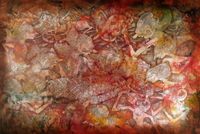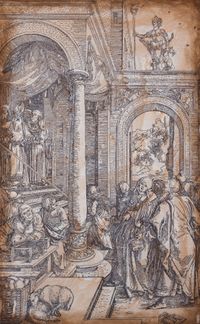Eddy Susanto is an Indonesian artist whose research-led practice delves into the historical narratives and processes of identity formation. He is best known for his reworkings of woodcuts and engravings by the German Renaissance artist Albrecht Dürer, centering Javanese society within the global constellation of art and cultural exchange.
Read MoreEddy Susanto studied graphic design at the Indonesian Institute of Art in Yogyakarta before becoming a commercial designer and book illustrator. His artworks draw upon the history and praxis of print across the globe, often aligning historical events and religious interpretations with Javanese references.
Java of Dürer (2011), which won Susanto that year's prestigious Bandung Contemporary Art Award, appropriates Albrecht Dürer's The Men's Bath (1496) by outlining the image in the 15th century hanacaraka script. Meticulously inscribed by pen on canvas, the work correlates the telling of Islam's arrival in Java in the 14th century with the European Renaissance. In doing so, Susanto points to the radical transformations that were taking place at that time in each region, repositioning sacred Javanese texts within Western art history.
Susanto continues to apply this technique to later series of paintings, incorporating important Javanese passages from the Babad Tanah Jawi, Mahabharata, and Ramayana into reinterpretations of Dürer's engravings of the Old Testament, as well as prints by Marcantonio Raimondi and Theodor de Bry. He is particularly interested in scenes and texts of historical change and encounter—especially those representing eastern subjects—mining art, literature, and science for compositions.
In 2015, Eddy Susanto exhibited Java Script at the National Gallery of Indonesia in Central Jakarta. Drawing parallels between Javanese script and the programming language JavaScript, the artist envisioned websites such as Google, Facebook, Baidu and Amazon as illuminated manuscripts from the Middle Ages. Replacing Latin and Chinese texts with those in Javanese, and featuring Indonesian ornamental devices, Susanto subtly suggests that our increasingly technology-driven society neglects local and ancestral knowledge, even though they are embedded in the same drive for understanding and connectivity.
Eddy Susanto is currently based in Yogyakarta.
Amy Weng | Ocula | 2021






